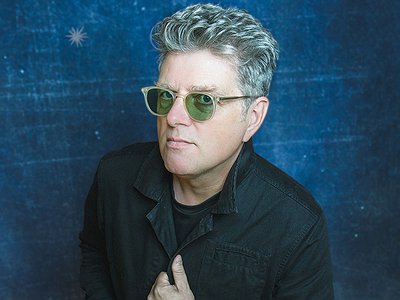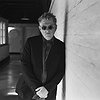Name: Tom Bailey
Nationality: British
Occupation: Songwriter, Singer, Producer, Multi-Instrumentalist
Current Release: Science Fiction will be released July 13th on Pledge Music
Recommendations: J.S.Bach: Die Kunst der Fuge; Rembrandt: any self portrait; Robert Sapolsky: Behave
Website / Contact: If you enjoyed this interview with Tom Bailey, visit his personal website or facebook profile for further news and background information.
When did you start writing/producing music - and what or who were your early passions and influences? What is about music and/or sound that drew you to it?
I’m told that I was reaching up to the piano keyboard from two years old. I was surrounded by classical and baroque music at home and, perhaps most significantly, by early DIY home hi-fi. My father was always building bigger and better speaker enclosures to reproduce bass. Being immersed in full frequency sound was perhaps an unusual experience at that time. It left me fascinated by the way things sound.
For most artists, originality is first preceded by a phase of learning and, often, emulating others. What was this like for you? How would you describe your own development as an artist and the transition towards your own voice? What is the relationship between copying, learning and your own creativity?
I was taking piano lessons from, I think, seven or eight years. And in a church choir from nine. Then school orchestra, playing clarinet before teenage imperatives caused me to pick up a guitar. Al these things were influential, but I wonder if this variety of experiences led me to be the sort of eclectic musician I became. The piano work involved the theory, but it was singing in a choir where I learned, by osmosis, about harmony. Nothing was ever explained, but developing an ear for the way notes go together and push and pull against each other ended up being one of the things I enjoy most. Like many teenagers, I found the guitar liberating - not only because it was the weapon of choice for rock’n’roll rebellion - but also for its self-contained mobile practicality. I could disappear to my room and make complete pieces of music with just a piece of wood and six strings.
What were your main compositional- and production-challenges in the beginning and how have they changed over time?
I had written long form complicated pieces for piano and experimental electronic works using tape recorders but, when I found myself writing songs, the challenge was always economy.
The pop song, with remarkably few exceptions, tends to tick the same series of boxes in terms of timing, structure and recognisable form. Yet it seems able to contain extraordinary variations within those confines. In that sense it is the haiku, or perhaps the sonnet of contemporary popular culture. So finding new expressions within the recognisable form has continued to be the fascinating problem and, in a way, that is a much more interesting notion than decisions about variations in genre or style.
What was your first studio like? How and for what reasons has your set-up evolved over the years and what are currently some of the most important pieces of gear for you?
My first “formal” studio was based around two stereo reel-to-reel tape recorders. I had an early Roland Compurhythm drum machine ( great if you wanted to arrange everything in a Latin/lounge style) which was soon replaced by the Movement Drum Computer. As soon as I could afford it, I bought an Oberheim OBXa polysynth and stopped using other instruments for a long time. I still have the OBXa. I built several more studios over the years, peaking (in investment terms) with 24track tape and enormous console etc etc, but found that it was strangely limiting to be tied to lots of hardware. Somewhere at the back of my mind was the adage, which I think came from Robert Fripp, that the ideal was to be a “small, mobile, intelligent unit”. Trying to stay with that approach has served me well over the years.
How do you make use of technology? In terms of the feedback mechanism between technology and creativity, what do humans excel at, what do machines excel at?
The amazing developments in personal computer tech have made the old fashioned formal studio effectively redundant for me. I travel way too much to be carrying lots of equipment all the time so, for my personal creative processes, a laptop and headphones have become my best friends.
It’s amazing to think that in the early days of my career, musicians were always trying to get into a studio. It was the Mecca of the musician’s world and everything they did lead to that point. These days, it’s perfectly possible to make a world-class record in a bedroom. I’ve mixed tracks in a hotel room - even recorded in the Indonesian jungle, just because that’s where I happened to be.
So the software studio as an instant production tool has made so much possible for me. The question of human excellence is dependent on goals, really, and these are often dictated by genre. For example, I am devoted to playing with my north Indian classical fusion group, the Holiwater Band. It’s all about deep understanding of traditions and complex structures brought to bear on improvised renditions of compositional ideas in live performance. It’s a very long way from the machine orientation of, say, a lo-fi experimental techno piece, but I love both. And the surprising reward is that if you give generously to each genre, then they start to inform each other within your understanding. And culturally, notwithstanding the current debates about appropriation (which are important), I often find that the natural processes of cross-fertilisation, which occur when two distinct traditions rub up against each other, are the most productive and fascinating. So it’s possible to attempt the most audacious leaps from one genre to another and land on something which sounds fresh, even though it relies heavily on the sources. But this is best done respectfully, looking up to the traditions involved rather than as an easy way of enlivening tired ideas.
Production tools, from instruments to complex software environments, contribute to the compositional process. How does this manifest itself in your work? Can you describe the co-authorship between yourself and your tools?
I have been using Logic for a long time now. I had many years of Fairlight, then ProTools, but Logic’s dependability as a portable work environment is outstanding. It has also become amazingly well-endowed with production tools, if you look behind some of the annoying attempts to make it seem like Garage Band’s big brother. I use a lot of Waves plug-ins, too.
The question of how transparent all of this is to my creative process is a difficult one. Of course, we like to feel that we are the agents of creation, but the technology must have its influence. I think that, if it is sufficiently complex, technology can be transparent enough because it offers so many choices about the way to proceed at any given point. But too many forks in the road can also be a crippling burden. Starting each session by auditioning a thousand different kick drums is impractical, so we must rely on rules of thumb which balance the accumulated wisdom of experience with a healthy desire to experiment. So the real answer lies in our behaviour around the options which technology gives us.
There is something interesting to understand about the way our brains work when we repeatedly do work in the same way. If it is rewarding, then eventually the anticipation of that reward yields strong feelings of satisfaction and well-being. We must be clear that the good feelings we get from work are from the content as well as the process otherwise we may become addicted to doing the same thing over and over, regardless of it’s intrinsic creative value. And if the equipment becomes more important than the music, we have wrong-footed ourselves as artists.



